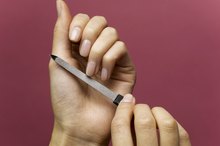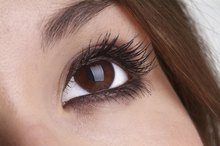What does fact checked mean?
At Healthfully, we strive to deliver objective content that is accurate and up-to-date. Our team periodically reviews articles in order to ensure content quality. The sources cited below consist of evidence from peer-reviewed journals, prominent medical organizations, academic associations, and government data.
The information contained on this site is for informational purposes only, and should not be used as a substitute for the advice of a professional health care provider. Please check with the appropriate physician regarding health questions and concerns. Although we strive to deliver accurate and up-to-date information, no guarantee to that effect is made.
Minerals for Fingernails and Fine Hair
Minerals are an essential dietary component; without them, you may experience hair and nail problems. Deficiencies in certain minerals can lead to thinning strands and weak, brittle or spotted nails. While taking these minerals is not likely to thicken naturally fine hair and nails, meeting the recommended dietary allowances, or RDA, can help ensure that your strands and nails grow at their very best. Discuss any dietary changes with your doctor before making them.
Iodine
Without the mineral iodine, your thyroid cannot function properly, and this organ is responsible for growth and development in every area of your body. Therefore, an iodine deficiency can lead to a variety of hair and nail problems, including slow hair growth and dry skin, hair and nails. You also can consume it as sodium iodide in a multivitamin, mineral or kelp supplement.
Zinc
Zinc for Nail Growth
Learn More
The cell division in your hair follicles and, therefore, the growth of your strands, depends on zinc. This mineral also helps protect the cell membranes in your hair, nails and other areas from incurring damage from free radicals. Your immune system, growth, development and thyroid function all require zinc to perform properly as well. If you do not get enough zinc, you may experience hair loss and white spots on your fingernails, among other problems. The RDA for zinc is 8 mg for women and 11 mg for men.
- The cell division in your hair follicles and, therefore, the growth of your strands, depends on zinc.
- This mineral also helps protect the cell membranes in your hair, nails and other areas from incurring damage from free radicals.
Selenium
For your body to make use of the iodine you consume, you need to get an adequate amount of selenium. This indirectly helps promote healthy skin and nails. However, be aware that consuming too much selenium can result in a condition known as selenosis, which can cause hair loss and nail problems, among other symptoms 3. However, this condition is rare and can be avoided as long as you do not exceed the RDA or begin consuming supplements without first discussing them with a doctor. Adults need 55 mcg of selenium a day.
- For your body to make use of the iodine you consume, you need to get an adequate amount of selenium.
Considerations
3 Vitamin Deficiencies That Can Affect the Health of Your Nails
Learn More
While minerals are essential for hair and nail health, they can interact with each other as well as with your medications, so you must discuss them with a doctor prior to consuming them. If you believe you have a mineral deficiency, talk to your doctor and tell him about the symptoms you are having. Similarly, if you have recently noticed a change in the thickness or texture of your hair or nails, seek medical attention.
Related Articles
References
- Huntington College of Health Sciences; Have a “Good Hair Day;” Gene Bruno; 2009
- University of Maryland Medical Center: Iodine
- MedlinePlus: Selenium in Diet;
- University of Maryland Medical Center: Zinc
- Phillips TG, Slomiany WP, Allison R. Hair Loss: Common Causes and Treatment. Am Fam Physician. 2017;96(6):371-378.
- Watras MM, Patel JP, Arya R. Traditional anticoagulants and hair loss: a role for direct oral anticoagulants? A review of the literature. Drugs Real World Outcomes. 2016;3(1):1-6. doi:10.1007/s40801-015-0056-z
- Urysiak-czubatka I, Kmieć ML, Broniarczyk-dyła G. Assessment of the usefulness of dihydrotestosterone in the diagnostics of patients with androgenetic alopecia. Postepy Dermatol Alergol. 2014;31(4):207-15. doi:10.5114/pdia.2014.40925
- Vincent M, Yogiraj K. A descriptive study of alopecia patterns and their relation to thyroid dysfunction. Int J Trichology. 2013;5(1):57-60. doi:10.4103/0974-7753.114701
- Peters EMJ, Müller Y, Snaga W, et al. Hair and stress: A pilot study of hair and cytokine balance alteration in healthy young women under major exam stress. PLoS ONE. 2017;12(4):e0175904. doi:10.1371/journal.pone.0175904
- Pratt CH, King LE, Messenger AG, Christiano AM, Sundberg JP. Alopecia areata. Nat Rev Dis Primers. 2017;3:17011. doi:10.1038/nrdp.2017.11
- American Academy of Dermatology. Alopecia Areata: Overview.
Writer Bio
Lynne Sheldon has over 12 years of dance experience, both in studios and performance groups. She is an avid runner and has studied several types of yoga. Sheldon now works as a freelance writer, editor and book reviewer. She holds a Bachelor of Arts in English and art history from Boston University and recently completed her Master of Fine Arts in writing from Pacific University.









